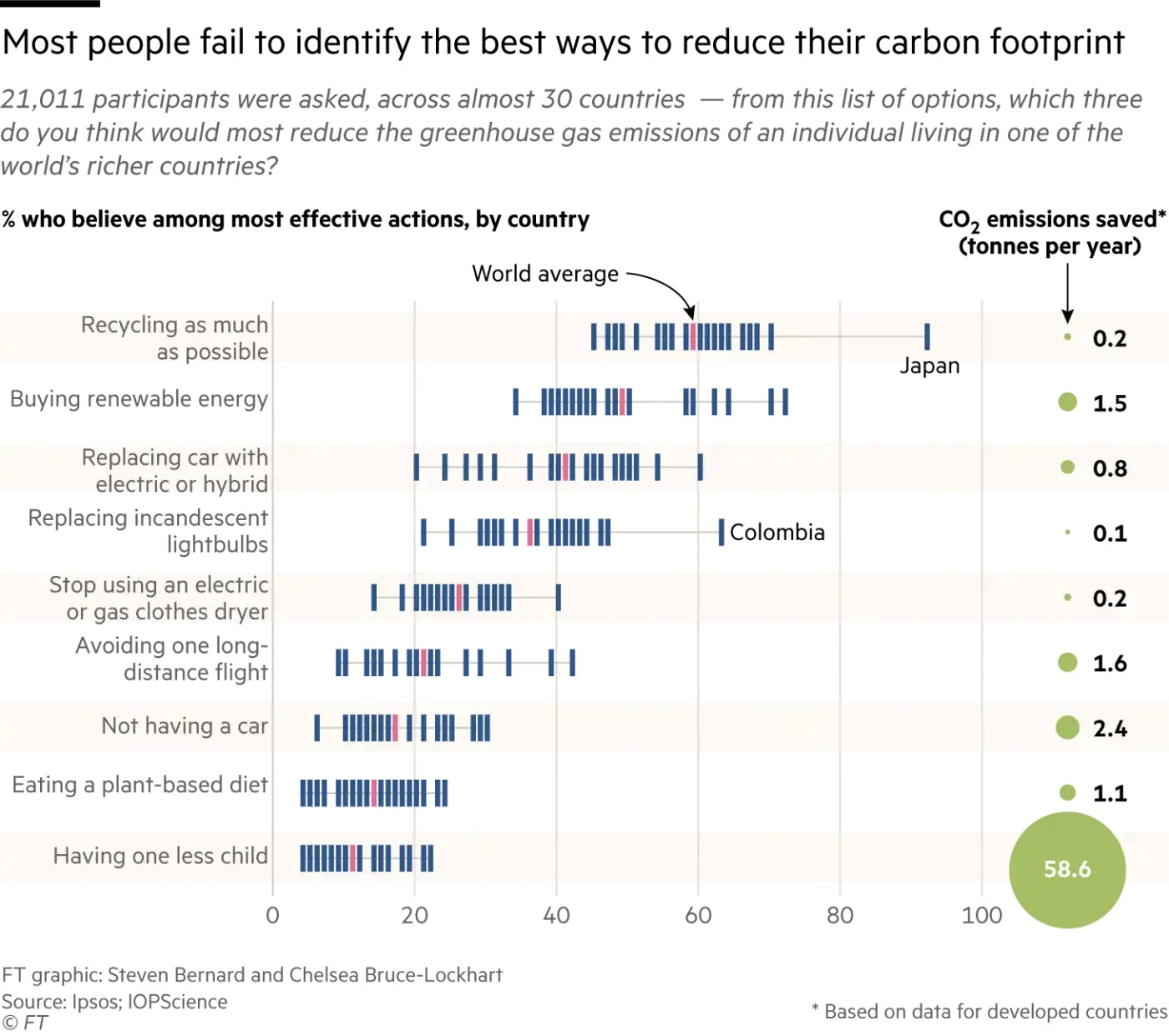Clothes dryer vs the car: the world has major carbon footprint misconceptions
Recent survey research indicates that most people over-estimate their understanding of how much individual actions affect the environment
A new report by polling firm Ipsos MORI highlights that most people cannot correctly identify the actions that can take to limit their carbon footprint, according to an international survey of more than 21,000 people across almost 30 countries. Yet, most of these same respondents believe that they know which actions are best to help tackle climate change. As a recent summary of the report in the FT noted:
Across all countries, the average person who took part in the survey almost consistently ranked an avoidance of tumble dryers and a switch to low-energy lightbulbs as more effective ways to reduce individual emissions — rather than not owning a car or choosing a plant-based diet. In reality, an individual using less carbon-intensive forms of travel, instead of driving a car, could prevent an average of 2.4 tonnes of carbon dioxide equivalent from being released into the atmosphere each year in a developed country. Air drying clothes would save just 0.2 tonnes of carbon emissions a year per person.
At a high level, the Ipsos researched reached three major conclusions:
Across markets, people on average underestimate the most impactful climate actions they can take, and overestimate the least impactful ones
Awareness of the climate change impacts we are already seeing is low. Few knew how warm recent years have been, or how many lives are already impacted by climate change
Climate action messaging can confuse: many think it’s better to eat local meat rather than imported plants, when the reverse is true: vegetarianism is far more impactful
The extent of the error is quite striking. For example, the graphic below illustrates that respondents ranked recycling as the action with the most beneficial environmental impact, when, in fact, it ranks seventh.
As the FT summary notes, “one of the options most ignored by respondents, as a possible way to reduce personal impact on the environment, was choosing to have fewer children.” This despite analysis that suggests “annual emissions saved from having one less child dwarfs that of other actions, at 58.6 tonnes of CO2-equivalent emission.”
When asked about global warming, most of the general public is unaware that the last six years have been the hottest on record. In yet another question, respondents significantly underestimated the impact that climate change is already having on where people can and can’t live. “Two in five (43%) believe conflict to be the greater cause of internal displacement,” note the authors. The reality, however, is that “(climate and weather) accounted for two-thirds (67%) of new displacements in the first six months of 2020.”
While these misperceptions are already significant, diet is the topic in which the public’s perception is almost completely opposed to reality. As the report notes:
According to research, going to a plant-based diet makes more of a difference to your carbon footprint than eating local, but the public guess this is the other way around. Almost 6 in 10 people around the world (57%) say eating a locally produced diet, including meat and dairy products, is a better way to reduce an individual’s greenhouse gas emissions while only 20% say eating a vegetarian diet with some imported products is more effective.
Only those in India are more likely to choose a vegetarian diet as the more effective option (47%), while those in Hungary (77%), Switzerland (73%) and France (70%) are most likely to choose a local diet as the best way to reduce greenhouse gas emissions.
Public understanding of the relative impact of meat and miles is also low. The public has little idea of the carbon emissions of burgers as an equivalent of driving in a car. Almost 9 in 10 people globally (86%) could not make a guess how far a vehicle would need to drive to match the carbon emissions of making one beef burger. Of those who tried to answer, the mean answer was 43km. Depending on car efficiency data from the IEA, the true journey length is between 38-119km, putting most answers at the lower end of the range.
There is some good news in the research, because “younger people were more aware of the environmental impact of having fewer children as well as the benefits of a plant-based diet.” Perhaps due to the longevity of recycling activism, “older populations placed more value in recycling.”
Because the researchers surveyed people in thirty countries, one of their more interesting findings is how confidence varied by country. For example, people in Japan were the least confident they knew how to lessen their environmental impact, while Peruvians and Columbians were the most confident. In no country, however, was a majority of the population surveyed not confident in their understanding, despite the fact that errors and misconceptions are frequent and global.
More than just an interesting collection of opinions, this research highlights a serious problem: most people feel generally convinced that they are taking actions to lessen their environmental impact even when these actions may not be as effective as believed. This is a tough lesson for environmental activists to hear, but they should heed it nonetheless. Indeed, despite the endless corporate messages about sustainability and the endless headlines about the environment, it seems most people do not fully understand how their behaviors impact the world around them. Environmental advocates and their government counterparts need to enhance their education to correct these misconceptions.
The Research
Ipsos MORI Perils of Perception Report 2021
Try out the Nature Conservancy's Carbon Footprint Calculator
Take the FT's climate change quiz here








